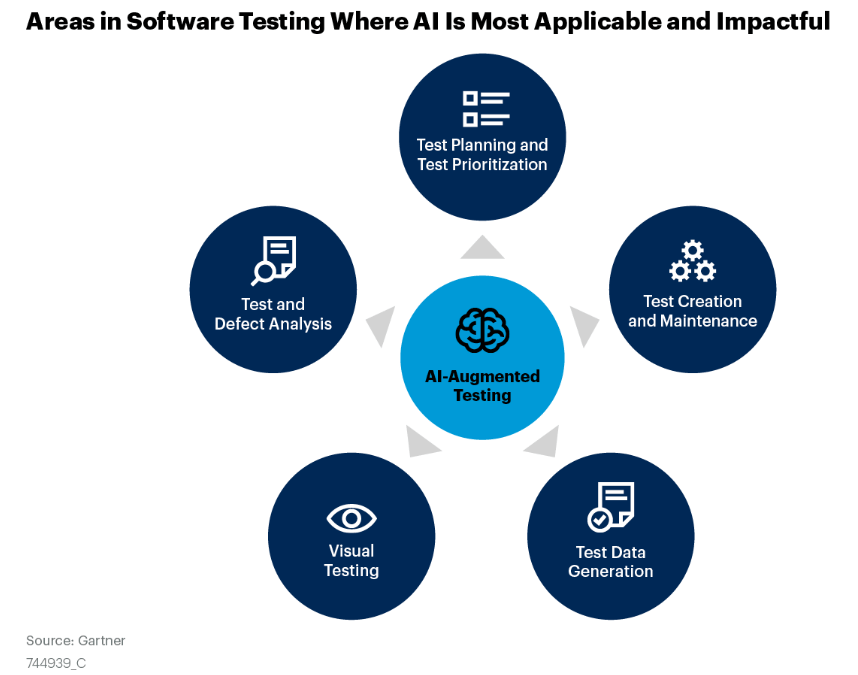The terms artificial intelligence (AI) and machine learning (ML) have evolved from being only buzzwords to fully formed technical tools. They have served as inspiration for numerous masterpieces and intellectual discussions. More significantly, they have made amazing advancements feasible in every conceivable field, including gaming and medicine.
As AI continues to make profound strides, its transformative influence extends beyond conventional realms, infiltrating industries such as software development. Software testing, an integral component of the software development life cycle, plays a crucial role in ensuring that applications meet quality standards and function as expected. With the relentless progression of technology, AI has seamlessly integrated into the landscape of software testing, ushering in a new era of efficiency and innovation.
In this article, we will explore the role of AI in software testing and the areas where it is most applicable and impactful as well as how to use AI in testing in revolutionizing traditional testing approaches.
How to Use AI in Testing
The integration of artificial intelligence (AI) into software testing has the potential to revolutionize how you ensure the reliability and functionality of your software. By leveraging AI algorithms and machine learning, this approach automates testing tasks that traditionally require extensive manual effort. Through the analysis of historical data, and understanding of how to use AI in testing, testers can easily predict defects, concentrate on high-risk areas, and enhance defect detection rates. Consequently, this contributes to an overall improvement in the efficiency, coverage, and accuracy of your software testing processes.
Moreover, these AI-driven tools play a pivotal role in streamlining the automation process. They are adept at generating test cases and executing diverse scenarios, accelerating the testing phase within your software development lifecycle. This not only speeds up the entire testing process but also diminishes the likelihood of human error.
AI Applications in Software Testing
The intersection of artificial intelligence (AI) and software testing has given rise to transformative applications that redefine how we ensure the robustness and reliability of software. As technology advances, the understanding of how to use AI in testing and its role offers innovative solutions to streamline processes and elevate the overall quality of software products.

Test Case Generation
Traditional Approach: Manual creation of test cases is time-consuming and may not cover all possible scenarios.
AI Impact: AI algorithms can analyze specifications, requirements, and historical data to automatically generate test cases, ensuring comprehensive coverage and efficiency. Tools like TestCraft and Applitools are utilizing AI for intelligent test case generation.
Test Data Management
Traditional Approach: Manually creating and managing test data can lead to inaccuracies and inefficiencies.
AI Impact: AI assists in generating realistic test data by understanding application requirements. It can create diverse datasets, covering various scenarios and ensuring the application is tested under different conditions. Tools like GenRocket leverage AI to synthesize data intelligently.
Automated Test Script Maintenance
Traditional Approach: Maintaining automated test scripts can be challenging, especially when the application undergoes frequent changes.
AI Impact: AI-powered tools can identify changes in the application and automatically update test scripts accordingly. This reduces the time and effort required for script maintenance, allowing teams to focus on testing rather than managing scripts.
Defect Prediction and Analysis
Traditional Approach: Identifying potential defects is only possible with insights from historical data.
AI Impact: AI algorithms can analyze historical data, predict areas prone to defects, and prioritize testing efforts. This proactive approach helps in preventing potential issues before they affect the end-users. Tools like Defect AI and QA Symphony leverage machine learning for defect prediction.
Performance Testing
Traditional Approach: Manual performance testing is time-consuming, and identifying bottlenecks can be complex.
AI Impact: AI enables the creation of virtual users, simulating real-world scenarios, and predicting system behavior under various conditions. It helps in identifying performance bottlenecks, analyzing results, and optimizing application performance. Tools like BlazeMeter and LoadRunner are integrating AI for efficient performance testing.
User Interface (UI) Testing
Traditional Approach: UI testing often involves repetitive tasks and may not cover all possible scenarios.
AI Impact: AI-driven testing tools can perform visual validation, identify UI elements dynamically, and adapt to changes in the application’s UI. This ensures robust UI testing with improved accuracy and efficiency. Applitools and Percy are examples of AI-driven UI testing tools.
Security Testing
Traditional Approach: Manually identifying vulnerabilities and security threats can be exhaustive and error-prone.
AI Impact: AI in security testing automates vulnerability assessments, detects potential threats, and provides insights into potential security risks, identifying vulnerabilities in code and dependencies.
Test Environment Management
Traditional Approach: Test environment setup and management can be time-consuming and error-prone.
AI Impact: AI can automate the setup and configuration of test environments, ensuring consistency across testing phases. It helps in reducing setup time and minimizing configuration errors, enhancing the reliability of test results.
The integration of AI into software testing marks a paradigm shift in the way we approach quality assurance in the realm of software development. The understanding of how to use AI in testing and its applications from predictive defect analysis to automated test case generation, exemplify the diverse ways AI enhances efficiency, coverage, and accuracy in testing processes. As AI continues to evolve, its impact on software testing promises to be both profound and enduring, ushering in a new era of innovation and reliability in software development. Embracing these AI applications not only addresses current testing challenges but also lays the foundation for a dynamic and adaptive future in software quality assurance.
